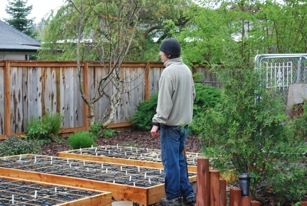
gardenday, l
(post, Caroline Lewis)
Of all the gardens we’re working on this year, the most wonderful has to be Penelope’s Garden. Four years old and born into poverty, Penelope is a fourth-generation Oregonian. She has stunning blue eyes, a sweet smile, and a heart of gold. Penelope is being raised by her new family, an extraordinary couple who have been so appalled by their glimpse into the world of hungry children that they decided to do something about it. Penelope’s new family, who have asked to remain anonymous, own a home in the Portland area with a large, sunny back yard. They decided they would like to dedicate their property to helping alleviate hunger. Their friend and realtor, Alexsandra Stewart, had met Larry and me at one of our spring Supper Club events, and suggested we get together with Penelope’s family. [%image carnation float=left width=200] Our new clients’ vision is ambitious but straightforward: Convert the entire property over time into an edible garden dedicated to feeding hungry Oregonians. Their inspiration has come from Penelope’s story, of course, an experience that has opened their eyes to the reality of hungry children right here in Portland. As they commented to us, “When Penelope entered our lives, she brought a face to all these numbers and statistics we heard about from the news. She gave us an acute awareness of what hunger really means to a child as day after day for months we witnessed the desperation that swept over her when she feared there would be no food. Seeing a 16-month-old child in such a state was very difficult for us.” Inspiration about what action to take came in part from a YouTube video they stumbled across about a Pasadena family’s urban farm, which helped them envision what their own large suburban lot could eventually become. [%image penelope2 float=left width=400 caption="Penelope inspired a garden."] Thus was born Penelope’s Garden. Our group — consisting of our clients, Alexsandra, Larry, and me — interviewed several nonprofit agencies that feed the hungry in the Portland metro area, but were unanimous in choosing Birch Community Services, Inc. (BCSI) as the group to which all the vegetables will be donated. Our friend Jake Greenberg of Classic Foods, who donates quite a bit of food to the agency, referred executive director Suzanne Birch to us. We were immediately impressed with Suzanne personally as well as with what her organization does for the Portland community. BCSI serves working-poor families in the Portland/Vancouver area. The families in the BCSI program are able to select wholesome, nutritious food, clothing, and household necessities at no cost at the agency’s spacious warehouse. The program also enables participants to acquire new skills in money management, computer use, and job searching through workshops and classes. Participants volunteer regularly at the BCSI warehouse to save on operational costs. This helps to keep the program running smoothly, helps to meet the financial obligations of the organization, and keeps overhead costs down. Our Penelope’s Garden team loves BCSI’s focus on helping people help themselves. Our garden, now in its early stages with five 4-foot-by-10-foot frames in place, is the first to donate organic produce to BCSI grown specifically for this purpose. [%image gardenday2 float=right width=300 caption="Kids help too."] Day one of Penelope’s Garden, May 13, was chilly and wet, a typical Oregon spring day. We had a large and varied group of volunteers to help throughout the day, including our assistant Kaylee and our friend Ryan, plus a number of BCSI volunteers and their kids. It was a big project and brought to mind the camaraderie and fun spirit of a traditional barn raising. On that first rainy day, we set up the garden and planted cabbage, marigolds, carrots, Swiss chard, onions, sunflowers, red-leaf and green-butter lettuce, nasturtiums, and borage (a lovely bee-friendly herb that helps winter squash to pollinate). Two weeks later, we added heirloom San Marzano and slicing tomatoes, as well as two kinds of red peppers. This week, we completed the summer planting with several kinds of winter and summer squash, cucumbers, and bush beans. Four of the five frames in the garden have vertical supports, which we are using to grow the cucumbers and San Marzanos. In the fall, we’ll plant these with overwintering sugar-snap peas, which will then help us get an early start on our 2010 growing season. Here’s our best guess as to what this garden will yield from just this summer’s crops: [%image theplantedgarden float=left width=400 caption="On the road to bounty."] • 192 carrots • 16 bunches of Swiss chard • 16 pounds of green beans • 64 heads of lettuce • 150 slicing tomatoes • 160 Roma tomatoes • 72 onions • 96 cucumbers • 16 heads of cabbage • 80 red bell peppers • 60 summer squash • 40 winter squash As with all of our gardens, everything is being grown organically and with local supplies, from the seeds and plant starts to the soil, irrigation system, and tomato cages. BCSI volunteers, led by Robyn Bachman, help Larry and me with the maintenance, including monitoring the soil moisture, planting, thinning, harvesting, and transporting harvested produce to the Birch warehouse for distribution. Our clients are already working with us to plan expanding the garden this summer to include three more beds to replace all the grass in the front yard. If we’re able to get these in by mid-July, we can plant them with fall-harvest and overwintering crops, including beets, broccoli, cabbage, carrots, collards, kale, lettuce, spinach, and more Swiss chard, among others. We are so impressed with Penelope’s family’s dedication to this project. As they wrote in an email to us recently, "Mother Teresa once said, ‘You can do no great things, only small things with love.’ Penelope's Garden is our ‘small thing’ done in love for the children of our community.” Ultimately, this caring family’s goal is for others to join them in growing gardens like Penelope’s Garden, or by sharing the harvest from their own gardens “so that Portland will become known as the city that eliminated hunger from their community simply by growing gardens.”

gardenday, l
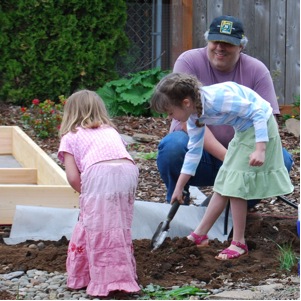
gardenday2, l
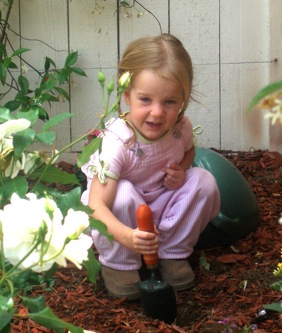
penelope2, l
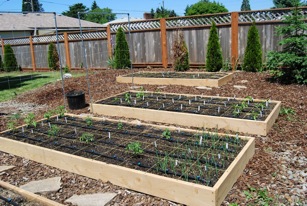
theplantedgarden, l
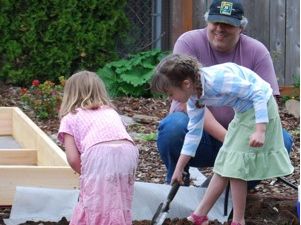
reference-image, l

carnation, l